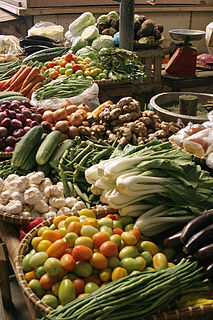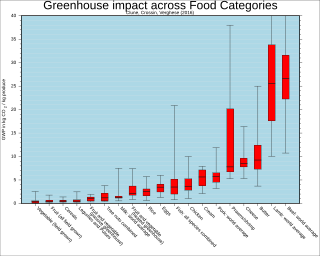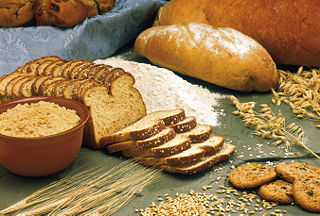
Vegetarianism is the practice of abstaining from the consumption of meat, and may also include abstention from by-products of animal slaughter.

A food pyramid is a representation of the optimal number of servings to be eaten each day from each of the basic food groups. The first pyramid was published in Sweden in 1974. The 1992 pyramid introduced by the United States Department of Agriculture (USDA) was called the "Food Guide Pyramid" or "Eating Right Pyramid". It was updated in 2005 to "MyPyramid", and then it was replaced by "MyPlate" in 2011.

The Paleolithic diet, Paleo diet, caveman diet, or stone-age diet is a modern fad diet consisting of foods thought by its proponents to mirror those eaten during the Paleolithic era.

The Mediterranean diet is a diet inspired by the eating habits of Greece, Italy, morocco, and Spain in the 1960s. The principal aspects of this diet include proportionally high consumption of olive oil, legumes, unrefined cereals, fruits, and vegetables, moderate to high consumption of fish, moderate consumption of dairy products, moderate wine consumption, and low consumption of non-fish meat products. Olive oil has been studied as a potential health factor for reducing all-cause mortality and the risk of chronic diseases.

In nutrition, diet is the sum of food consumed by a person or other organism. The word diet often implies the use of specific intake of nutrition for health or weight-management reasons. Although humans are omnivores, each culture and each person holds some food preferences or some food taboos. This may be due to personal tastes or ethical reasons. Individual dietary choices may be more or less healthy.

Raw foodism, also known as rawism or following a raw food diet, is the dietary practice of eating only or mostly food that is uncooked and unprocessed. Depending on the philosophy, or type of lifestyle and results desired, raw food diets may include a selection of fruits, vegetables, nuts, seeds, eggs, fish, meat, and dairy products. The diet may also include simply processed foods, such as various types of sprouted seeds, cheese, and fermented foods such as yogurts, kefir, kombucha, or sauerkraut, but generally not foods that have been pasteurized, homogenized, or produced with the use of synthetic pesticides, fertilizers, solvents, and food additives.

A plant-based diet or a plant-rich diet is a diet consisting mostly or entirely of plant-based foods. Plant-based foods are foods derived from plants with no animal-source foods or artificial ingredients. While a plant-based diet avoids or has limited animal products, it is not necessarily vegan. The Academy of Nutrition and Dietetics states that well-planned plant-based diets support health and are appropriate throughout all life stages, including pregnancy, lactation, childhood, and adulthood, as well as for athletes.

A healthy diet is a diet that helps maintain or improve overall health. A healthy diet provides the body with essential nutrition: fluid, macronutrients, micronutrients, and adequate food energy.

Environmental vegetarianism is the practice of vegetarianism when motivated by the desire to create a sustainable diet that avoids the negative environmental impact of meat production. Livestock as a whole is estimated to be responsible for around 18% of global greenhouse gas emissions. As a result, significant reduction in meat consumption has been advocated by, among others, the Intergovernmental Panel on Climate Change in their 2019 special report and as part of the 2017 World Scientists' Warning to Humanity.

A food group is a collection of foods that share similar nutritional properties or biological classifications. List of nutrition guides typically divide foods into food groups and Recommended Dietary Allowance recommend daily servings of each group for a healthy diet. In the United States for instance, USDA has described food as being in from 4 to 11 different groups.
The DASH diet is a dietary pattern promoted by the U.S.-based National Heart, Lung, and Blood Institute to prevent and control hypertension. The DASH diet is rich in fruits, vegetables, whole grains, and low-fat dairy foods. It includes meat, fish, poultry, nuts, and beans, and is limited in sugar-sweetened foods and beverages, red meat, and added fats. In addition to its effect on blood pressure, it is designed to be a well-balanced approach to eating for the general public. DASH is recommended by the United States Department of Agriculture (USDA) as a healthy eating plan. The DASH diet is one of three healthy diets recommended in the 2015-2020 US Dietary Guidelines, which also include the Mediterranean diet or a vegetarian diet. The AHA considers the DASH diet "specific and well-documented across age, sex and ethnically diverse groups."

A semi-vegetarian diet (SVD), also called a flexitarian, is one that is centered on plant foods with the occasional inclusion of meat. Flexitarian is a portmanteau of the words flexible and vegetarian, signifying its followers' less strict diet pattern when compared to (other) vegetarian pattern diets.

The Western pattern diet (WPD) is a modern dietary pattern that is generally characterized by high intakes of red meat, processed meat, pre-packaged foods, butter, candy and sweets, fried foods, conventionally-raised animal products, high-fat dairy products, eggs, refined grains, potatoes, corn and high-sugar drinks, and low intakes of fruits, vegetables, whole grains, grass-fed animal products, fish, nuts, and seeds. The modern standard American diet was brought about by fundamental lifestyle changes following the Neolithic Revolution, and, later, the Industrial Revolution.
The Dietary Guidelines for Americans (DGA) provide nutritional advice for Americans. The Guidelines are published every 5 years by the US Department of Agriculture, together with the US Department of Health and Human Services. Notably, the most recent ninth edition for 2020 - 2025, includes dietary guidelines for children from birth to 23 months.

Animal source foods (ASF) include many food items that come from an animal source such as fish, meat, milk, eggs, honey, cheese and yogurt. Many individuals do not consume ASF or consume little ASF by either personal choice or necessity, as ASF may not be accessible or available to these people.
Sustainable diets are defined as "those diets with low environmental impacts that contribute to food and nutritional security and to healthy lives for present and future generations. Sustainable diets are protective and respectful of biodiversity and ecosystems, culturally acceptable, accessible, economically fair and affordable, are nutritionally adequate, safe, and healthy, and optimize natural and human resources." These diets attempt to address undernourishment, nutrient deficiencies and obesity and covers ecological phenomena such as climate change, loss of biodiversity and land degradation.

Pescetarianism is the practice of using seafood as the only source of meat in a diet that is otherwise vegetarian.
In agricultural economics and development economics, Bennett's law observes that as incomes rise, people eat relatively fewer calorie-dense starchy staple foods and relatively more nutrient-dense meats, oils, sweeteners, fruits, and vegetables. Bennett's law is related to Engel's law, which considers the relationship between rising household incomes and total food spending.














